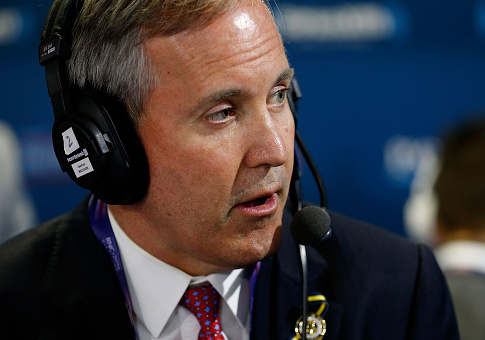Texas Attorney General Ken Paxton, who is leading a coalition of 16 states in support of President Trump's travel ban targeting six Muslim majority countries, accused courts that halted the executive order of a hypocritical interpretation of the president's role in determining who enters the country.
Texas was the first state to try to block the resettlement of Syrian refugees there by suing the federal government and earlier this year opting out of the program entirely. Texas Republican leaders, including Gov. Greg Abbott, said they were worried about the security issues the refugees pose because the Obama administration refused to disclose information about its process of vetting the refugees to state and local officials.
"Maybe they were doing extreme vetting but what good is it to us when they won't share" the information gathered in the vetting process with state officials, Paxton told the Washington Free Beacon in an interview this week.
"So we didn't know who to worry about and who not to so we sued over it and were told that this is the purview of the federal government and the president, and now that there's a different president suddenly it seems to be a problem for the courts" that determining who enters the country is a presidential function, he said.
Paxton also stressed that Trump's travel ban relates to seven countries officially designated as terrorist hotbeds in a law Obama signed in December 2015. That law contains language that placed new limits on travel to the United States for people who had lived in or visited Iran, Iraq, Sudan, or Syria since March 2011.
They no longer could enter the United States without a visa in the visa-waiver program, which allows 90-day states for citizens of certain countries. The Homeland Security Department quickly expanded the law to include Libya, Somalia and Yemen in the definition of "countries of concern."
"So remember, it was Obama who actually made this list, and it wasn't a problem until Democratic attorneys general started suing in the 9th and 4th circuits" to stop Trump from expanding the restriction to become a temporary pause, instead of a normal visa application process, he said.
The Supreme Court is expected to take up the issue later this year.
The executive order is needed now more than ever after the terrorist attacks in Manchester, Paxton argues. The temporary pause in entry would apply to people from Libya, where authorities arrested suspects linked to the Manchester attack.
"We want to be able to tell the community [in Texas and other states] that they are safe—if you look at what's going on in England or France or Belgium, we just don't want to import problems like they've imported and be lax in our security measures because my first responsibility is to the citizens of my state—their security, their well-being," he said.
Paxton said he recognizes the desire to help Syrian refugees and other suffering under the Islamic State's reign of terror but that effort cannot surpass the need to protect U.S. citizens.
"Whether we're willing to help people from other countries, I think that's great. We should be open to it and we've done it since the beginning of our country, but there's a balance here and our first responsibility is making sure that what we're doing isn't causing a high risk to our citizens."
In the multistate brief Paxton filed he argues that courts—including the Supreme Court—have long recognized the president's power to determine the country's immigration laws.
Federal statute specifically authorizes the president to "suspend the entry of all aliens or any class of aliens as immigrants or nonimmigrants, or impose on the entry of aliens any restrictions which may deem to be appropriate," he said.
Different presidents have enacted a total of 44 travel bans of some kind since 1980, and Obama has imposed six, he said.
"None of them has ever been struck down except for President Trump's—so that's a little odd that suddenly it's a problem," he argued.
On the debate over whether the executive action should be called a travel "ban" or not, Paxton said it's up for the courts to determine. In a string of tweets earlier this week, Trump stressed the need to refer to the executive order as a "travel ban" and criticized his Justice Department for submitting a "watered down, politically correct version" to the Supreme Court.
"It doesn't matter for us legally," Paxton said. "It's kind of irrelevant what you want to call it—a travel ban, travel suspension, travel hold—whatever. In the end, the courts are going to decide—hopefully based on what the statute actually says and what the executive order actually says."
